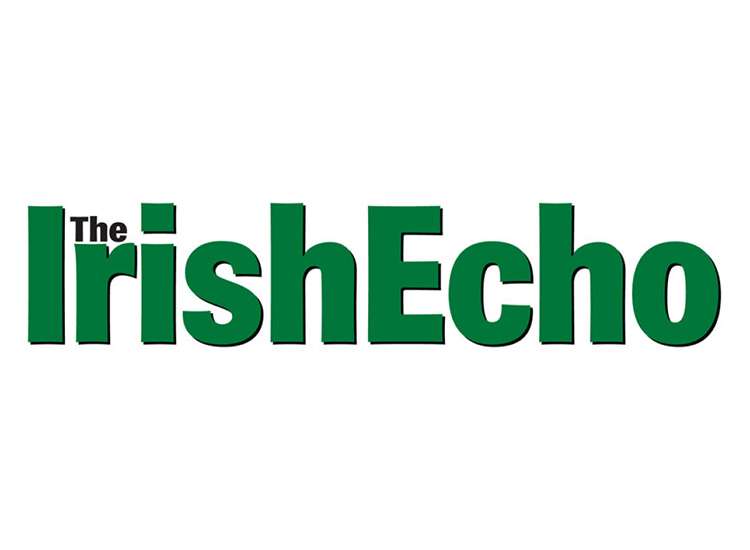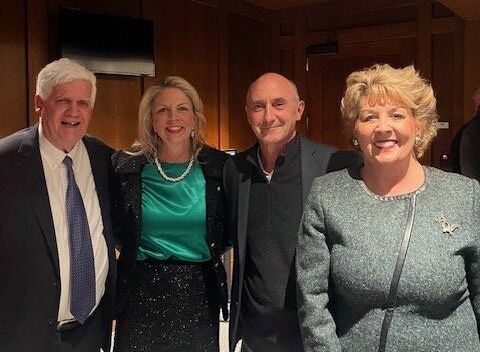Peter Ryan, Consul General of Ireland to Hong Kong and Macau, presenting the Irish Trophy at the Happy Valley racecourse in Hong Kong.
By Ray O’Hanlon
On July 1, 1997, the sun finally set on the British Empire.
On that day, the British handed over sovereignty of Hong Kong to the Chinese.
The day before, June 30, Hong Kong, the British version, ensured that the sun was continually shining on a Britannic dot somewhere on the planet.
And there were still a few dots, mainly islands in the Atlantic, Pacific and Indian oceans that were sufficiently strung out across the globe so as to catch the sun’s rays, even as half the planet was in darkness.
The subtraction of Hong Kong created a gap in the chain.
And the sun duly set on the gap.
Of course, the British presence around the world was maintained in another form: diplomacy.
Even after Hong Kong’s return to Chinese sovereignty, after 156 years, the sun was always shining on some far flung outpost of her majesty’s Foreign and Commonwealth Office, Hong Kong included.
The same could be said of Irish diplomacy, more or less.
In the next few years this will change to more than less.
In August of last year, Taoiseach Leo Varadkar announced plans to double Ireland’s worldwide diplomatic presence by 2025.
The “Global Footprint” initiative will involve resources for new and augmented diplomatic missions, as well as increased cultural exchanges, said an Irish government release.
By diplomatic missions, Dublin means embassies and consulates.
The immediate plan stretches over eight years, and indications are that it will continue beyond this timeframe.
After the 2025 announcement it would be only a matter of weeks until the first new diplomatic roll out took place with the opening of a new Irish Embassy in Kenya.
On Wednesday, November 8, Minister for Foreign Affairs and Trade, Simon Coveney, and his Kenyan counterpart, Dr. Amina Mohamed, jointly opened the Embassy of Ireland in Nairobi.
“Ireland,” said Mr. Coveney at the opening, “is connected to the global community through its history, its values and its status as a small open economy with worldwide trading links. Perhaps because our country is an island, Irish people are deeply connected with many people and events around the globe.”
Ireland’s embassy network, said Coveney, “is a vital asset for us as a small island nation navigating a rapidly-changing global environment. Our embassies support Ireland’s international co-operation and trade, they raise the profile of our country, our people, and our culture. They assist us in engaging new partners and friends. They inform our foreign policy, promote our values and defend our national interests.”
This was a return to a corner of the world which, like Hong Kong, was once part of the British Empire.
Ireland once had an embassy in Nairobi but it was closed in 1988 for what Mr. Coveney described as “economic reasons.”
It was now opening again in a different time and in markedly different economic circumstances, for both Ireland, one of Europe’s fastest growing economies, and Kenya, one of Africa’s most dynamic economies - even if its political democracy has lately come in for political scrutiny, most especially in terms of increasing restrictions on a free press.
Be that as it may, the Kenya gathering was not isolated.
Coveney had earlier unveiled his government’s intention to open “new resident diplomatic missions” in New Zealand, Chile, Colombia, Jordan, Vancouver and Mumbai.
This was in addition to increasing staff numbers working in several Irish embassies in Europe, including London.
“Ireland’s Embassies are an extremely important means of expanding and diversifying our trade portfolio as we prepare for Brexit. They are also the principal means for expanding our engagement and our interests across the globe, and importantly so, in Africa,” Coveney told his Kenyan hosts.
In these few words, Coveney revealed some of the reasoning behind Irish diplomatic expansion.
The British government had been talking up the idea of “Global Britain” in the context of its withdrawal from the European Union.
London has no choice really. Brexit is, by any measure, a retreat, a departure from a big stage, the EU. Something has to fill the void; so, the rest of the world.
Ireland is remaining in the EU but faces economic loss as a result of the next door neighbor leaving the bloc.
So Europe…and the rest of the world.
The fact is that in the coming years Ireland - proclaimed loudly of late by government ministers as the only “English common law, English speaking” member of the EU - will find itself competing with the UK in the business of forging unilateral trade deals with countries, some of them former outposts of the empire that once enjoyed perpetual sun.
Again, Simon Coveney: “The announcement of these new Irish Embassies and Consulates are important first steps in expanding our global footprint and diversifying our trade portfolio as we prepare for Brexit.
“The new Embassies in Santiago, Chile and in Bogotá, Colombia will assist in promoting trade and investment with both countries.
“Chile is a high-income country, the most competitive economy in Latin America, and enjoys the region’s highest investment rating. Like Ireland, it is an open, trading economy with a broad network of trade agreements, including with the European Union. It is a promising emerging market for Irish companies in a number of sectors including technology, higher education, telecoms equipment and renewable energy.
“With almost 50 million people, Colombia has doubled its per capita income over the past decade. Ireland’s trade with Colombia has tripled since 2012 and a number of Irish companies are already active there. A Free Trade Agreement with the European Union ensures ease of access for Irish exporters and investors. Our new Embassy will also underpin Ireland’s support for the peace process in Colombia, which in 2016 brought to an end fifty years of conflict
“We also plan to open an Embassy in Amman, Jordan, a highly strategic location in terms of our work and investment in the Middle East. The Embassy will allow us to build on our political partnership with Jordan, work closely with our Defence Forces in the region and facilitate oversight of our humanitarian assistance (€25 million in the region last year).
“The opening of a Consulate in Vancouver in western Canada reflects the strength of the Ireland-Canada relationship, the growing economic importance of that region and also the fact that there is a large Irish community now living there.
“This will strengthen our hand when helping Irish business to take full advantage of the opportunities offered by the EU-Canada Comprehensive Economic and Trade Agreement, with the Consulate serving as a gateway for Irish business to western Canada.
“The addition of a Consulate in Mumbai, India’s commercial capital, will significantly strengthen our presence in another of Ireland’s key strategic partners. We exported almost €3 billion in goods and services to India during 2016 and the new Consulate will allow the establishment of an Ireland House to facilitate even greater engagement by our State agencies throughout the western region of India.
“With Japan already our largest trading partner in Asia for services and a growing market for our food exports, and building on potential offered by the new EU-Japan Economic Partnership Agreement, the Government has also provided the funding to begin work next year on a new state-of-the-art Ireland House in Tokyo, which will position us to take advantage of these opportunities.”
On the plan to open an embassy in Wellington, New Zealand, Mr. Coveney noted: “There are almost 14,000 Irish born people in New Zealand and one in six New Zealanders claim Irish heritage. There are also significant trade opportunities, including in agri-technology and services, and opportunities to increase tourism - over 32,000 New Zealanders visit Ireland every year and there is scope for that to grow.”
The expansion announced in the closing months of 2017 has been described by the Irish government as a “first step.”
Arguably, it’s also a forced step.
“These new missions are an integral part of the government’s response to Brexit, which highlights the need for Ireland to be ambitious in seeking out trade opportunities in new markets,” said Mr. Coveney.
“I want us to enhance Ireland’s visibility globally, extending our influence and positioning ourselves for growth in new and existing markets. Five of the new Missions are in countries that either already have, or are likely to have, Free Trade Agreements with the EU. And Missions on the ground help Irish companies to take advantage of these new opportunities.
“We will also better serve the Irish diaspora in regions where Ireland has not been present.”
As it happens, five of the proposed new diplomatic missions are in countries that either already have, or are likely in the short to medium term to have, free trade agreements with the EU.
And, presumably, free standing deals with EU member Ireland if Irish diplomacy has its way.
Ireland had a diplomatic corps up and running before the formal and internationally recognized creation of the Irish Free State.
The archived records of sovereign Irish diplomacy date back to 1919 after the first Dáil created the Department of Foreign Affairs.
By the end of 1919 the nascent free nation had eight diplomatic missions overseas, including in, somewhat ironically, the United Kingdom, and also United States.
The Department of Foreign Affairs would later have its name changed to the Department of External Affairs. It would subsequently revert to its original name before becoming, in recent years, the Department of Foreign Affairs and Trade.
Trade, of course, is a most important foreign affair and is set to become more important still as the Republic of Ireland readjusts to a new reality forced upon it by Brexit.
That new reality will entail reaching out to receptive countries, first and foremost by means of diplomatic outposts in those countries.
In some cases, Irish embassies have diplomatic ties with more than the immediate host country.
An example of this is Mexico. The current Irish ambassador in Mexico City is Barbara Jones, former Consul General in New York.
Jones has a wide brief. And that is nothing to do with the fact that Mexico is a big country. She is also Dublin’s ambassador to Colombia, Costa Rica, Cuba, El Salvador, Nicaragua, Peru and Venezuela.
Even when Colombia is subtracted and an Irish ambassador takes up residence in Bogota that is still a lot of territory for Jones to cover.
Still, another green pin in the world capitals map is a clear signal of a small country’s intent to be noticed to a greater degree on the grand global stage.
Along with the green pins there will be a need for more diplomats.
It’s fair to say that Irish diplomacy punches well above its weight, but all that punching can be wearing.
Ireland’s Consul General in Hong Kong is Peter Ryan, like Jones, a veteran of the consulate in New York City.
Ryan opened the door on the first Irish Consulate in Hong Kong back in September, 2015. The South China Morning Post newspaper noted at the time that the arrival of an Irish diplomat in the former British colony was seen by many “as a strategic move as Ireland's economy picks up after the global financial crisis.”
Consul General Ryan, whose remit also covers the former Portuguese colony of Macau, has made his mark, no doubt about it.
But he finds himself, to say the least, outnumbered. And not least by her majesty’s diplomats in that old sunny spot on the imperial map.
The British Consulate in Hong Kong is something of a diplomatic monster with about 150 people working in it.
And if post-Brexit Britain feels that it has to go out into the world in order to do business it is unlikely that the Foreign and Commonwealth Office will be handing out pink slips. On the contrary.
Ireland’s Department of Foreign Affairs and Trade will duly take note as it presides over a diplomatic chain now girdling the earth.
That chain is not only made up of buildings but, more importantly, people.
More of them will indeed be needed to make the desired “global footprint” a meaningful Irish imprint spanning all the lines of longitude.








